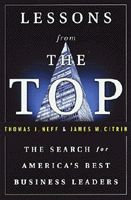
|
 |
Lessons from the Top: The Search for America's Best Business Leaders Thomas J. Neff and James M. Citrin with Paul B. Brown 
Format: Paperback, 464pp. ISBN: 9780385493444 Publisher: Doubleday Pub. Date: April 17, 2001 Average Customer Review: For Bulk Orders Call: 626-441-2024 Description and Reviews From The Publisher: In Lessons from the Top, Thomas J. Neff and James M. Citrin - the U.S. Chairman and a Managing Director of the executive search firm Spencer Stuart - set out to identity the most successful business leaders in America, based on the most exacting standards imaginable. Then, in an extraordinary series of what amounts to master classes, the authors sit down with each of the fifty executives to discuss the long-term strategies, key accomplishments, guiding beliefs, and career milestones that have helped to make their organizations among the best-run companies in the world. Reviews From Rajat Gupta - Wall Street Journal A truly groundbreaking book. From Industry Standard - Michelle V. Rafter Bernie Ebbers, a missionary's son, views his role as president and CEO of MCI WorldCom as an opportunity to serve the Lord. The last thing Autodesk Chairwoman and CEO Carol Bartz wants to be is a role model, let alone someone's mentor. Campbell Soup Chairman David Johnson says the best preparation for running a multinational company was growing up on a ranch in Australia. Dig deep enough in Lessons From the Top and you'll find gems like these. But dig you must. This 418-page compilation of interviews with the country's top 50 business leaders is often dull, shallow and poorly organized. The authors get an "A" for effort, though. Thomas J. Neff and James M. Citrin, respectively chairman and communications practice managing director at leading executive recruiter Spencer Stuart, tackled an ambitious job. Instead of creating a subjective list of the usual business-magazine cover boys and girls, they used quantitative research to determine top U.S. companies based on criteria like shareholder return then used that list to pick profile subjects, including the heads of several private companies and nonprofits. The profiles, in which executives are paraphrased or quoted verbatim about such issues as leadership, competitive strategies and employee morale, are only as revealing as the men -- and 47 of 50 executives included are men -- want to be. Readers are treated to Ebbers candidly talking about how growing up as a missionary's son on a Navajo reservation helped shape his "egoless" management style. Martha Ingram, who became the chairwoman of privately held Ingram Industries after the death of her husband, Bronson, says her greatest training for the job was raising five kids. Bartz speaks passionately against mentoring. "I've watched people who have been mentored and you just wonder why they are acting the way they are," she says. "They are trying to copy a style that may work for someone else, but it sure doesn't work for them -- and they are left with nothing." And growing up on an Australian ranch, Campbell Soup's Johnson had an early introduction to "owner mentality" -- the idea that "what we earned and how well we did depended upon our talents and our capabilities," he says in the book. But interviews of the 11 technology- and computer-company leaders included in Lessons are disappointing, and in some cases a bit dated. America Online Chairman Steve Case says nothing he hasn't uttered a dozen times before. The same goes for Intel's Andy Grove. The profile of Bill Gates -- who was interviewed for the book by e-mail -- makes no mention of the ongoing Justice Department investigation of Microsoft's business practices, an inexcusable omission. Still, Lessons From the Top has its moments. As Neff and Citrin find, business leaders often share many traits, which they sum up as "doing the right things right." Their business all-stars lead by example, work from a plan, act fast, surround themselves with great people and inspire employees with more than just stock options. They're smart, articulate, hard-working, passionate about what they're doing and at peace with themselves. That's as good a path to follow as any, for managers of Internet startups or anyone aspiring to one day occupy the corner office. Chair and communications director, respectively, of Spencer Stuart, a leading executive search firm, Ness and Citrin have selected 50 leaders from the private sector (e.g., Bill Gates, Jack Welch, and Charles Schwab) and the American Red Cross's Elizabeth Dole from the public sector to give us "lessons from the top." The authors interviewed each selectee, asking specific questions regarding personal triumphs; leadership strategies; methods of relating to subordinates, competitors, and shareholders; and why they think they run a solid, profitable, well-respected organization. This readable, comprehensive, and timely compilation complements many of the individual biographies already published, but the thought-provoking qualitative and quantitative analysis of the selection process sets this book apart. (Selection was based on Gallup findings, financial analysis, and references, with a detailed explanation of the methodology provided.) A good choice for business collections in academic and public libraries.--Steven J. Mayover, Free Lib. of Philadelphia Copyright 1999 Cahners Business Information. From Publisher's WeeklyHeadhunters Neff and Citrin of Spencer Stuart U.S. set out systematically to identify, profile, interview and capture the vision of the nation's top 50 CEOs. Through their company, they commissioned Gallup polls, gathered performance data and constructed a list of intangibles ("showed the ability to overcome challenges," "demonstrated consistent strength of character," etc.). The final results don't look all that different on the surface from countless other books purporting to offer the managerial motherlode, but in this case the difference is in the details. Interviews with AT&T's Mike Armstrong, Charles Schwab, Martha Ingram (one of four women named), Louis Gerstner, Bill Gates and Bill Marriott are all illuminating, revealing complementary aspects of captaining the ship without making redundant observations. A few of the notions even seem worker-centered: Starbucks' Howard Schultz points to the decision to provide equity and stock options to employees, even part-timers, as one of the main reasons why his company's attrition rate is below 60% annually (compared with the national average of 250%). The book is filled with such ideas, presented with a minimum of self-promotion from their purveyors. A final section of "lessons learned" offers a "new definition of success" that begins "live with integrity and lead by example." As concise and clear a management guide as readers are likely to find, this is a great tip sheet on business leadership. (Aug.) Copyright 1999 Cahners Business Information. About the Authors Thomas J. Neff is Chairman of Spencer Stuart U.S. Hailed by The Wall Street Journal as "The No. 1 Brand Name in CEO Searches," he has been profiled on the cover of Business Week and in the Money & Business section of The New York Times. James M. Citrin is Managing Director of Spencer Stuart's Global Communications and Media Practice. He has authored articles in The New York Times and has appeared on CNBC and CNN. The authors live in Connecticut. Table of Contents
Find Items On Similar Subjects |
|

The Essential Lists BOOKS TO READ BEFORE YOU LEAD 
Grow Your Leadership Skills NEW AND UPCOMING LEADERSHIP BOOKS 
Classic Leadership Books BOOKS TO READ BEFORE YOU LEAD |
 |
| ||
 | © 2019 LeadershipNow™ All materials contained in https://www.LeadershipNow.com are protected by copyright and trademark laws and may not be used for any purpose whatsoever other than private, non-commercial viewing purposes. Derivative works and other unauthorized copying or use of stills, video footage, text or graphics is expressly prohibited. |
||